Tag Archive: courage
April 18, 2021
The Food Solutions New England 21 Day Racial Equity Habit Building Challenge for 2021 is moving into its last week and shifting from the theme of “Reckon and Repair” to “Regenerate.” And it just so happens that the Revolutionary Love Conference happened this past weekend, providing amazing array of speakers, deep wisdom, inspiration and what feels like a rich transition that aligns with where the Challenge is heading (both thematically and in its encouragement of learning and action that takes its thousands of participants from 21 days to 365). This year’s theme of Revolutionary Love was “The Courage to Reimagine,” and while I was not able to attend all of the gathering, what I did catch was nourishing, and the social media stream (#RevLove21 on Twitter) was on the best kind of fire. What follows is a harvest of 21 quotes from the presentations and conversations.
“We have become a people who accept racism and poverty as conditions, when they are actually crises.” – Rev. Traci Blackmon
“We all know someone who is more outraged by Colin Kaepernick’s knee than Derek Chauvin’s… No one hates like a Christian who’s just been told their hate isn’t Christian.” – John Fugelsang
“Public confession without meaningful transformation does nothing.” – Rabbi Danya Ruttenberg
“Too often, our framing of God prevents us from moving toward a just society—just as capitalism uses theological vocabulary but centers predatory self-interest.” – Otis Moss, III
“How can we retrain the eye to see all others as part of us, one human family. We can train our eyes to look upon the face of anyone and say, ‘You are a part of me I do not yet know. I will open myself to your story. I will let your grief into my heart.” – Valarie Kaur
“White people need to stop being white and start being ethnic again. When you leave the US no one is seeing you and saying “Oh hey you’re white!” They’ll want to know where you’re from, ethnicity carries stories – what is your STORY?” – Otis Moss, III
“I would like to get rid of words like inclusion and say democratization. I’d like for us to get rid of words like diversity and say democratization.” – Ruby Sales
“We must demand a society that will not withhold from others that which we would not want withheld from ourselves.” – Dean Kelly Brown Douglas
“I want white evangelicals to stop talking about reconciliation and talk about justice and repair.” – Robert P. Jones
“I want to stand as a bulwark that things can be different, even in the most stalwart, white supremacist, bigoted families.” – Rev. Rob Lee
“Change is possible when we stop seeing others as needy and start seeing each other as necessary.” – Rev. Traci Blackmon
“Speaking truth to power isn’t only about taking on the President or the GOP, it’s also about taming the power of our own ego.” -Irshad Manji
“Too often, our acts of moral courage go unacknowledged—even by ourselves. We don’t realize the impact we have on others who observe us, and benefit from small mundane acts of resistance in the face of unimaginable daily horror.” – Wajarahat Ali
“I love my enemies for purely selfish reasons. It moves me toward a cure for the life-denying disease of returning hate for hatred. Love may lead to defeat. It may lead to death. But it will not let hatred have the final word.” – Dr. Miguel De La Torre
“White relatives, we’re not asking for a handout of charity. This [reparations] is an invitation—a lifeline to your own humanity and liberation.” – Edgar Villaneuva
“This is a time of reckoning and reconstruction, and policy is my love language. . . . There’s been hurt and harm legislated for generations. Long before our pandemic, our nation was already in crisis.” – Ayanna Pressley
“What would you do? What would you risk, if you truly saw no stranger? How will you fight with us? … It is the practice of a community, and we all have a different role in the work at any given time.” – Valarie Kaur
“Love is always asking: How do I tell this truth and still stay in relationship?” – Krista Tippett
“Think of how much change we leave on the table when we assume that the other will never see things from our point of view, so we must get in their face and humiliate them. Think of how much social change we may be leaving on the table.” – Irshad Manji
“There are so many awesome people in every political party, every demographic of age, sexuality, gender, etc. – these awesome people have GOT to find each other.” – Van Jones
“Racism is a putrid, festering hole in our nation’s soul, and that will only change when we have the courage to love a different way. That love must become an everyday spiritual practice, like flossing or brushing our teeth.” – Dr. Rev. Jacqui Lewis
September 5, 2019
Over the past couple of months I have brought the poem below into a few different gatherings. Amidst flux, uncertainty, volatility, and pending collapse, it can be difficult to figure out how to orient, what to hold onto. So leave it to the poets to throw us a life line. Or in this case a thread.
William Stafford is a source of consistent solace and sanity to me, and “The Way It Is” I have found particularly grounding …
There’s a thread you follow. It goes among
things that change. But it doesn’t change.
People wonder about what you are pursuing.
You have to explain about the thread.
But it is hard for others to see.
While you hold it you can’t get lost.
Tragedies happen; people get hurt
or die; and you suffer and get old.
Nothing you do can stop time’s unfolding.
You don’t ever let go of the thread.
Colleagues and I have used this as an opening check-in with various groups and then invited people to name their thread. Here is some of what has come up:
- People, those that I care for and who care or me.
- The moral arc that bends towards justice.
- Courage to hold on to what is possible.
- Grace.
- Tenderness.
- Imagination.
- The fire of passion.
- Love, love and love.
What is the thread you hold that guides and grounds you in these times?
February 19, 2019
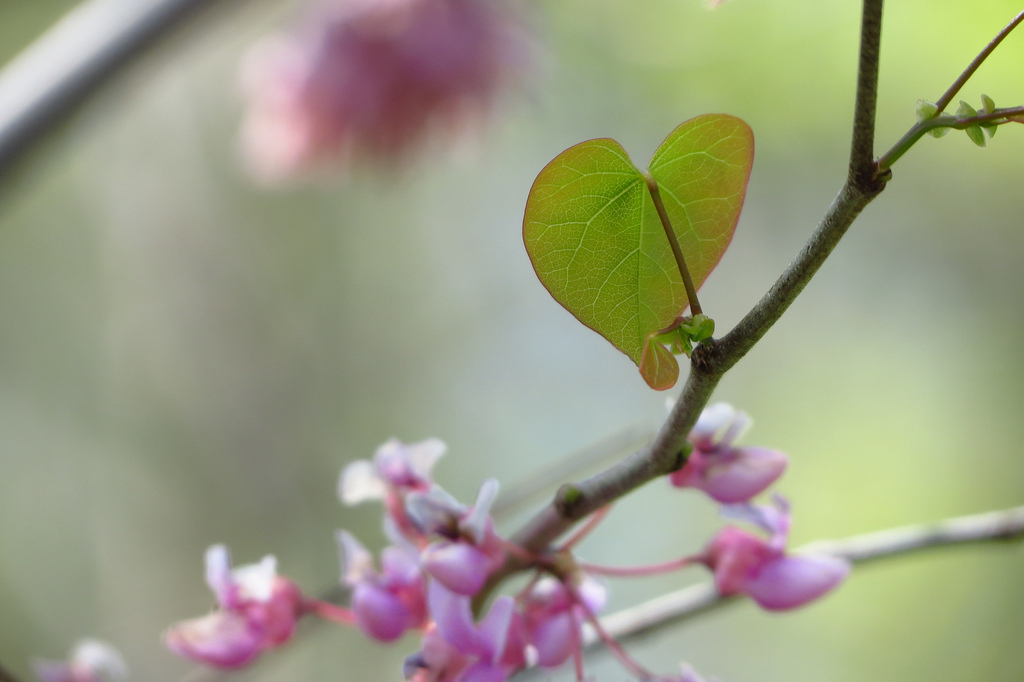
Photo by tracydekalb, “Redbud Love,” shared under provisions of Creative Commons Attribution license 2.0.
The following post was originally published in 2014, and has been edited. In many ways it feels even more relevant five years later …
Over the past dozen years or so at IISC (our half-life as an organization, and my whole life as a member of this amazing community), we have seen and experienced some interesting progressions. In our Facilitative Leadership for Social Change trainings and consulting work, we talk about the “interior condition” of effective collaborative and network leadership. When I first joined the organization, we used to say that collaborative leaders and change agents embraced an ethic of “service, authenticity and respect.” Then we made the move of changing “respect,” which came across to some as a bit weak, to LOVE. For the first couple of years after making this switch, when we asked “What’s love got to do with it?” with respect to effective leadership and work for social change, there were definitely some uncomfortable silences. Some participants would ultimately want to rename love as “respect” or “passion.”
Then in 2009 we started noticing a change. More heads nodded in rooms when we mentioned the “L-word,” less nervous laughter and shifting in seats. In one particularly striking instance, during a training with health care and public health professionals, a senior and very respected physician responded,
“What’s love got to do with it? Everything! Beyond my technical skills, I am effective in so far as I am able to really see my patients, students, and colleagues, to make them feel seen for who they are.”
Read More
January 7, 2019
“That which counts, can rarely be counted.”
-Albert Einstein

Image by garlandcannon, used under provisions of Creative Commons Attribution License 2.0.
In a couple of articles that have been re-cycling in different social circles, the reminder is offered that tipping points for social change do not need anywhere close to a majority of actors.
A few years ago, scientists at Rensselaer Polytechnic Institute explored what it takes for an idea to spread from few to many, for a minority opinion to become the majority belief. According to their study, the RPI researchers said that the answer is 10%. When one in ten people adopt a stance, eventually it will become the dominant opinion of the entire group, they say. What is required is commitment.
More recently, researchers from the University of Pennsylvania and the University of London conducted an experiment that suggests that for activists to achieve a tipping point around change, 25% of a given population is required. They published their study in the journal Science.
Of course there are complicating factors, including the fact that there are often competing factions each vying for their own 10-25% and with social media and disinformation campaigns, confusion can rein and commitment may require an additional degree of diligence. Nonetheless, we might take more heart in the power of the few.
And this is clearly not just about numbers and counting.
Read More
May 8, 2017
“Clearly, we made some people uncomfortable. Good. For too long, our comfort has come on the backs of many who have been uncomfortable for a long, long time.”
–Niaz Dorry, FSNE Process and Network Team Member
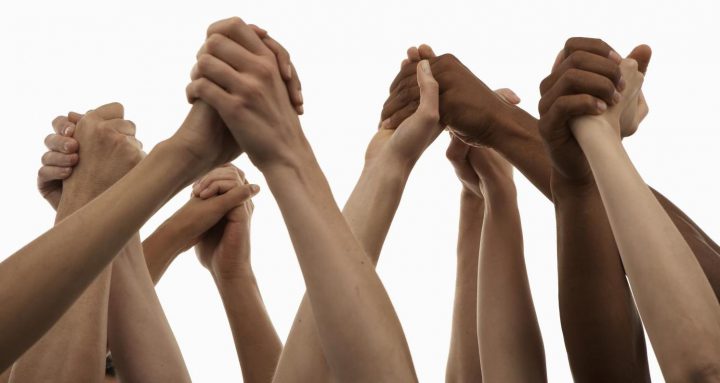
Food Solutions New England (FSNE) is a regional, collaborative network organized to “support the emergence of a New England food system that is a resilient driver of racial equity and food justice, sustainable farming and fishing, and thriving communities.”
For the past 5 years, IISC has supported FSNE to launch and structure itself as a formal network, as well as to concretize and evolve its core commitment to racial equity as it has become more diverse and inclusive and focused on systemic transformation. Over the winter, editorial staff from the Othering and Belonging Journal at the Haas Institute for a Fair and Inclusive Society solicited an article submission from FSNE to tell the story of why and how the network has operationalized its commitment to racial equity and food justice.
“While Othering processes marginalize people on the basis of perceived group differences, Belonging confers the privileges of membership in a community, including the care and concern of other members. As [john a.] powell has previously written, ‘Belonging means more than just being seen. Belonging entails having a meaningful voice and the opportunity to participate in the design of social and cultural structures. Belonging means having the right to contribute to, and make demands on, society and political institutions.'”
–Andrew Grant-Thomas, from Othering and Belonging Editors’ Introduction
The article was published last week under the title “Equity as Common Cause,” co-authored by El Farrell, Tom Kelly and Joanne Burke of the UNH Sustainability Institute (the convenor of FSNE), Karen Spiller of KAS Consulting and the Albert Schweitzer Fellowship (Karen is lead FSNE Ambassador) and myself, as network facilitator, with input and voices of many others, including Connecticut Senator Marilyn Moore, Julius Kolawole of the African Alliance of Rhode Island and Niaz Dorry of North Atlantic Marine Alliance. Read More
September 24, 2015
“A generous heart is always open, always ready to receive our going and coming.”
– bell hooks

For the past month I’ve been in conversation with David Nee, former Executive Director of the William Caspar Graustein Memorial Fund, to reflect on some of our shared experiences in advancing the Memorial Fund’s collaborative work for equity in the early childhood system in Connecticut. The impetus for these reflections was an invitation to co-author a blog post for a series on “network entrepreneurship” in the Stanford Social Innovation Review. The introductory post, written by Jane Wei-Skillern, David Ehrlichman and David Sawyer, is entitled “The Most Impactful Leaders You’ve Never Heard Of.” While it is true that many of the leaders featured are not necessarily household names, this does not preclude focus on those with formal authority who are visible in their own respective domains. That said, emphasis is on what people often don’t see or appreciate about what these “network entrepreneurs” do, including making space for others (see this post for some of the key network and collaborative leadership roles that are not always appreciated). Read More
May 13, 2015
“Out on the edge you see all the kinds of things you can’t see from the center.”
~Kurt Vonnegut

Last week while having a discussion with a group about food system economics, I was reminded that the word “externalities” does not always refer to something bad. An externality can also be something beneficial that is not formally accounted for by “the market.” This had me reflecting on what can happen in networks, really any collaborative endeavor, where some of the real “goods” remain out of sight, on the edges of peripheral vision, at least with respect to where people typically tend to concentrate focus. Read More
June 28, 2013

If you’re not familiar with six word memoirs, it’s a project of SMITH Magazine, which has as its mission to celebrate the joy of passionate, personal storytelling. As the SMITH folks say, it’s all about “One life. Six Words, What’s yours?”
So over here at IISC we did a little passionate, personal storytelling of our own the other day…each creating a six-word memoir in the moment.
Read More
August 15, 2012
“There is a contradiction in wanting to be perfectly secure in a universe whose very nature is momentariness and fluidity.”
-Alan Watts
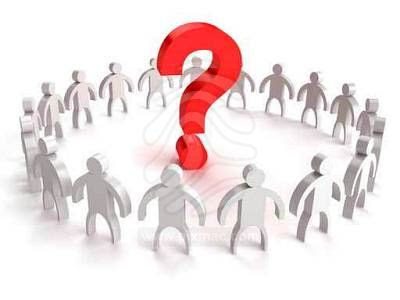 Earlier this week I facilitated and participated in a momentous meeting in one of the state-wide change processes I have been involved with for the past few years. This meeting featured community and parent organizers, “service providers,” funders, and other educational advocates from across the state in conversation with newly hired state-level staff charged with creating a plan for ensuring greater alignment of state agencies in the direction of better opportunities and outcomes for all young children. Read More
Earlier this week I facilitated and participated in a momentous meeting in one of the state-wide change processes I have been involved with for the past few years. This meeting featured community and parent organizers, “service providers,” funders, and other educational advocates from across the state in conversation with newly hired state-level staff charged with creating a plan for ensuring greater alignment of state agencies in the direction of better opportunities and outcomes for all young children. Read More
November 10, 2011
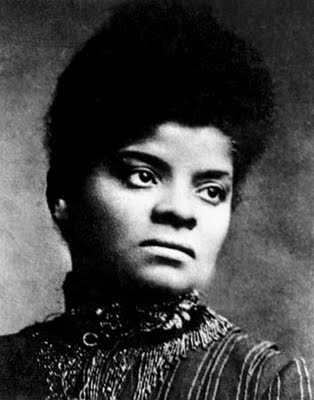
Ida B. Wells was an African American journalist, newspaper editor and, with her husband, newspaper owner Ferdinand L. Barnett, an early leader in the civil rights movement. She documented lynching in the United States, showing how it was often a way to control or punish blacks who competed with whites. She was active in the women’s rights and the women’s suffrage movement, establishing several notable women’s organizations. Wells was a skilled and persuasive rhetorician, and traveled internationally on lecture tours.
October 7, 2011
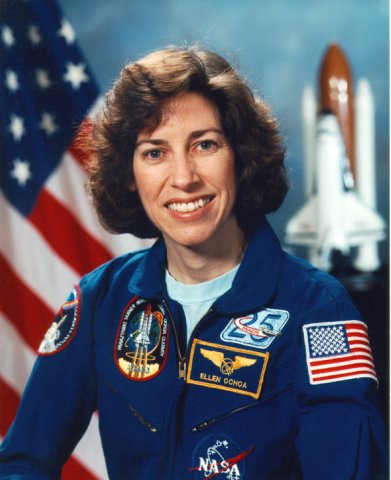
Ellen Ochoa is best known for being the first Hispanic woman astronaut, having made 4 space voyages, since being recruited by NASA, in 1991. But, she is also a noted inventor, with three patents for her work in optics, is a trained classical flutist and private airplane pilot
September 27, 2011
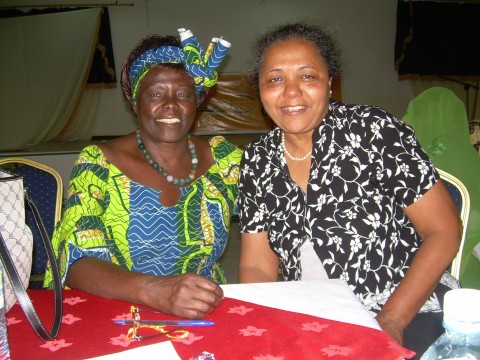
By now you have heard that Wangari Maathai has died. I feel especially blessed to have met this remarkable woman before and after she became known on the world stage.
Read More












 Earlier this week I facilitated and participated in a momentous meeting in one of the state-wide change processes I have been involved with for the past few years. This meeting featured community and parent organizers, “service providers,” funders, and other educational advocates from across the state in conversation with newly hired state-level staff charged with creating a plan for ensuring greater alignment of state agencies in the direction of better opportunities and outcomes for all young children.
Earlier this week I facilitated and participated in a momentous meeting in one of the state-wide change processes I have been involved with for the past few years. This meeting featured community and parent organizers, “service providers,” funders, and other educational advocates from across the state in conversation with newly hired state-level staff charged with creating a plan for ensuring greater alignment of state agencies in the direction of better opportunities and outcomes for all young children. 

